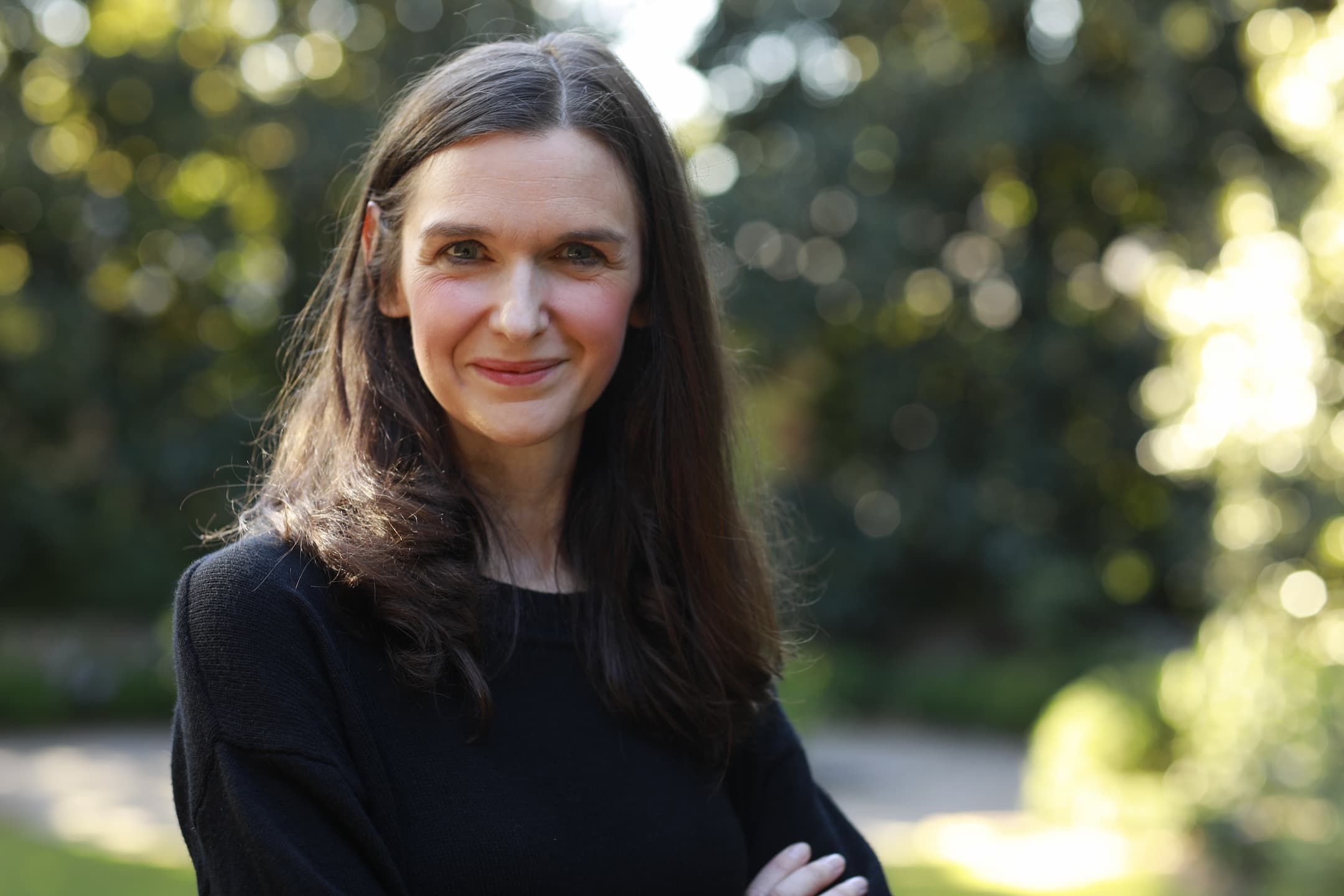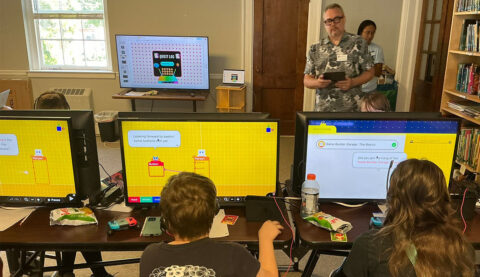Doctor of Education (Ed.D.) in Learning, Design, and Technology
Doctor of Education (Ed.D.) in Learning, Design, and Technology

My program of study is in learning, design, and technology, and my areas of expertise include human performance technology, instructional design, needs assessment, and medical education.
Associate Professor
Overview
Offered by the Mary Frances Early College of Education, the Doctor of Education (Ed.D.) in Learning, Design, and Technology (LDT) prepares the next generation of leaders to effectively engage in the scholarship of practice in technology-enhanced learning environments through the application of design thinking and research methods. This degree is designed for administrators, educators, and instructional design practitioners with prior experience. The degree offers working professionals from a variety of educational settings (e.g., P-12 education, higher education) an opportunity to advance in their own organizational or professional context (e.g., coach, director).
The degree is designed primarily for working professionals who desire to deepen and broaden their understanding and application of:
- The design and integration of technology to enhance learning in a variety of public education contexts.
- The principles and theories that guide the effective design and integration of technology for learning.
- The scholarship and research related to the learning and design that undergirds these principles and theories.
- Methods of assessment, evaluation, and practice-based research that enhance the design and integration of technology for learning; and
- Ways to contribute to the broader academic and practitioner community by sharing and communicating.
Two areas of emphasis are offered, which focus on:
- Instructional Design and Development is geared for working professionals in higher education, healthcare, and business and industry contexts.
- Instructional Technology in P-12 Education (with an available upgrade for currently certified educators)
Coursework is focused on design-based thinking, innovating to solve problems, making data-informed decisions, and using scholarship and research to improve instructional outcomes in the field. The degree is offered in an online format that blends synchronous and asynchronous methods.
Accreditations
The University of Georgia is accredited by the Southern Association of Colleges and Schools Commission on Colleges (SACSCOC) to award baccalaureate, master’s, specialist, and doctoral degrees. The University of Georgia also may offer credentials such as certificates and diplomas at approved degree levels. Questions about the accreditation of the University of Georgia may be directed in writing to the Southern Association of Colleges and Schools Commission on Colleges at 1866 Southern Lane, Decatur, GA 30033-4097, by calling (404) 679-4500, or by using information available on SACSCOC’s website (www.sacscoc.org).
Admissions
The EdD in Learning, Design, and Technology is accepting applications for Fall 2026.
Admission Requirements
- Hold a bachelor’s and master’s degrees from an accredited college or university.
- Have a cumulative grade point average for all previous undergraduate courses as being 3.0 or above on the 4-point scale.
Online Doctorate of Education in Learning, Design, and Technology Application Checklist
The Ed.D. in Learning, Design, and Technology admits students each fall.
When completing the Graduate School application, you will be asked to submit the following documents:
- Application – Submit the Graduate School Admissions online. Application fee: $75 Domestic / $75 International.
- Select Campus – Online
- Select Degree Level – Doctoral
- Select Intended Program – EDD, Learning, Design and Technology (Workforce Ed & Instruct Tech) [EDD_LEDT_ONL]
- Select Intended Term – Fall
- Official GRE Scores
- Résumé or curriculum vitae – Upload to the Graduate School.
- Statement of Purpose (no more than five pages)
The applicants should provide an overview of who you are (e.g., your background, interests, etc.), why you want the Ed.D., what you plan/hope to do as a result of having the doctoral degree and how you see this degree contributing to your professional and personal goals. It is also essential to include responses to the following questions:- What are your current research interests?
- Who do you think among our faculty would be your best advisor and why? (You can nominate 1-3 people as possible advisors with a rationale for each.)
- How do the research interests of the selected advisors fit with your own interests?
- Transcripts – Upload unofficial transcripts from all institutions attended as part of the online application. Send official transcripts after you are offered admission.
- Letters of Recommendation – Submit three letters of recommendation online to graduate school. Letters should be from individuals who can evaluate the applicant’s scholarly ability and potential for success in a graduate program. Preferably, at least two of them are from faculty who have instructed the applicant in a previous program of study. The application will prompt your recommenders to submit their letters electronically.
- Sample of Scholarly Writing
- Statement of declaration
- You are agreeing to commit yourself to the academic pursuit of a doctoral degree. You can expect that this will require you to…
- Dedicating time to attending your courses. Courses will typically meet weekly or bi-weekly after 5pm and can last up to several hours.
- Dedicating time outside of your course sessions to your own research. You can expect to spend several hours a week or more reading about your area of interest and conducting your own research as you progress in the program.
- Staying in-step with the cohort; if you don’t, you risk needing to wait up to a year to rejoin the next cohort (check the ed leadership)
- Finding mutually convenient times to meet with your advisor about your research outside of class.
- Regular and meaningful contributions to the program’s virtual community.
- You are agreeing to commit yourself to the academic pursuit of a doctoral degree. You can expect that this will require you to…
- Applicant Video
- The LDT faculty would like to learn more about you and your specific interest in our Ed.D. program. Therefore, we are requesting a short video introduction (3-4 minutes max) from you to augment your written materials. We are particularly interested in your research interests and experience with instructional design.
- Your video can be informal, such as you on your smartphone enjoying an afternoon outdoors, or something else you enjoy. Please do not read from a script. Our goal is to learn more about the way you communicate your thinking.
- Video Content
Your introduction video will be reviewed by the LDT admissions committee and should answer the following:- Why are you interested in an Ed.D. in LDT at the University of Georgia?
- What does instructional design mean to you?
- What [specific] research topic would you like to explore?
Applicants should use an internet-based service (e.g. YouTube, Vimeo) to host the video and make sure settings allow people with the video URL to view the video (i.e., unlisted setting).
International applicants must submit TOEFL or IELTS scores. Have official entrance exam scores sent to the UGA Graduate School by the testing service. Specify UGA as the recipient of the scores, institutional code for ETS reporting: 5813
Application Deadlines
Domestic Applications
The EdD in Learning, Design, and Technology is accepting applications for Fall 2026.
Applicants are accepted for Fall semester admission. When applying for the Fall semester, the application deadlines are:
- February 1
Curriculum
This 51-credit program may be completed within 3½ to 4 years. Coursework and critical milestones develop expertise in learning, design, and technology, and the action-research dissertation progress.
Area of Emphasis in Instructional Design and Development included these three courses:
- EDIT 8220E, Learning Experience Design (3 hours)
- EDIT 8350E, Advanced Evaluation Methods in Learning, Design, and Technology (3 hours)
- EDIT 9150E, Advanced Performance Systems Analysis in Learning, Design, and Technology (3 hours)
(Instructional Design and Development program of study .pdf)
Area of Emphasis in Instructional Technology P-12 Education
- EDIT 8320E, Advanced Technology Integration Planning (3 hours)
- EDIT 8400E, Games and Learning (3 hours)
- EDIT 9200E, Designing Professional Development through Technology (3 hours)
(Instructional Technology P-12 program of study .pdf)
First Year
Your courses fulfill your core requirements, covering the foundations of theory, research, and practice in learning, design, and technology. Instructional design and design-based research methods are also hallmarks for the first-year content.
Second Year
Deepen your knowledge and skills related to design, evaluation, performance systems, or professional development, and learn a variety of research methods.
Third and Fourth Year
During this time, your focus is on your action research project/dissertation and practicum. You will work alongside faculty who are internationally recognized as leading scholars in the fields of learning, design, and technology for both school settings and business and industry.
Faculty
News & Events
The Ed.D. in Learning Design & Technology to host Information Session on January 5, 2026.
December 15, 2025The Learning, Design, and Technology program is excited to announce that we will be hosting two upcoming information sessions on Monday, January 5, 2026, for prospective students interested in the Ed.D. in Learning, Design, and Technology. https://calendar.uga.edu/search/events?search=LDT 1pm-2pm EST 6pm-7pm EST These sessions are designed to help you learn…
UGA’s First Fully Online Doctoral Degree to Launch in Learning, Design, and Technology
August 11, 2025The University of Georgia’s Mary Frances Early College of Education is introducing the online Doctor of Education (Ed.D.) in Learning, Design, and Technology, the university’s first fully online doctoral program. Starting Fall 2026 but accepting applications now, this 51-credit program is designed for experienced administrators, educators, and instructional design professionals looking to lead technology-enhanced learning initiatives in P-12 schools, higher education, healthcare, and industry.
Brains, games, and VR frames: How UGA researchers are rewriting the rules of learning
August 7, 2025Virtual reality simulations that teach residents how to prepare and react to natural disasters. Game-based systems that help unlock neurodiverse kids’ problem-solving skills and interest in STEAM (science, technology, engineering, the arts and mathematics). Artificial intelligence programs that help people with epilepsy remember to take their medicines. These are the kinds of innovative educational tools University of Georgia researchers are developing to revolutionize how teachers teach and students learn.
Contact Information
Complete the Request for Information form below, and your request will be sent to Jill Stefaniak, Ph.D. Program Coordinator for the Doctorate (Ed.D.) in Learning, Design, & Technology program.
Contact us using the request for information form or call 706-452-7940.







